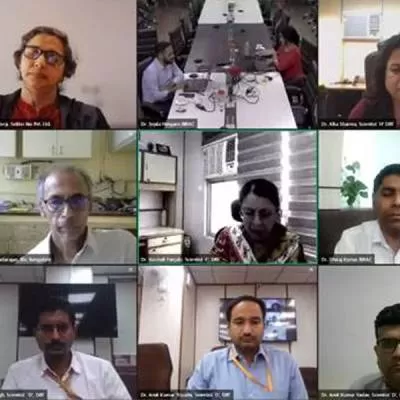
Mumbai, May 20 -- The Department of Biotechnology (DBT), Government of India, in collaboration with the Biotechnology Industry Research Assistance Council (BIRAC), conducted the 14th webinar under the Biofoundry and Biomanufacturing Initiative on 16 May 2025. The session, themed "Biomanufacturing for mRNA Therapeutics", forms a key part of the BioE3 Policy (Biotechnology for Economy, Environment & Employment), which aims to position India as a global leader in bio-based innovation.
Launched by the Union Cabinet and the Minister of Science & Technology, the BioE3 Policy focuses on sustainable biomanufacturing across key sectors such as precision therapeutics, including mRNA technology, to drive economic development and affordable healthcare.
The webinar brought together researchers, academics, start-ups, and industry stakeholders to discuss India's progress and prospects in mRNA therapeutics biomanufacturing.
Dr Alka Sharma, Senior Adviser at DBT, noted that the BioE3 vision seeks to foster high-performance biomanufacturing to drive a global "BioRevolution" anchored in sustainability. She stressed the importance of mRNA therapeutics within this framework and acknowledged the efforts of Indian biotech companies working in this domain. However, she also pointed out persistent sectoral challenges such as product delivery, stability, and reliance on imported raw materials.
Dr Varshneya Singh, Scientist 'D' at DBT, provided an overview of the mRNA therapeutics landscape, highlighting its potential in treating cancer, genetic disorders, and infectious diseases. He presented a SWOT analysis of the field and introduced the Call for Proposals for Precision Biotherapeutics - mRNA Therapeutics, a joint DBT-BIRAC initiative to promote innovation and scale-up in this emerging space.
Dr Raghavan Varadarajan from IISc Bangalore detailed the mRNA-LNP vaccine development pipeline, explaining the structure, formulation workflows, and comparative advantages of various lipid nanoparticle delivery systems and microfluidic chip technologies used in mRNA formulation.
Dr Monalisa Chatterji, from Sekkei Bio Pvt Ltd, explored the broader challenges of biologics adoption in India and the immense potential of RNA-based therapeutics. She underscored the urgent need for capacity expansion and greater capital investment to bring these advanced treatments to market at scale.
The webinar concluded with an interactive Q&A session, moderated by officials from DBT and BIRAC. Participants engaged with the panellists on regulatory frameworks, scalability, and innovation strategies in the biomanufacturing of RNA-based therapies.
The event reinforced India's strategic focus on biotech innovation and the transformative potential of mRNA technologies in reshaping the nation's healthcare and bioeconomy landscape.
Published by HT Digital Content Services with permission from Construction World.
